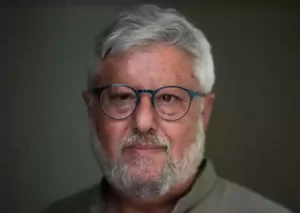We, like all Israelis and Palestinians, have spent the past six weeks in pain, anger, tears, frustration, and fear searching with our minds and souls for some path towards a future for our two people which steers us on a new course – one of living and not dying. Watching the images of death and destruction makes it almost impossible for an Israeli and a Palestinian to sit together and watch the news – zapping between Israeli and Palestinian television channels. The reporting is so different and the images are from two different realities.
Even the two of us who share so many of the same values and same strategic outlook find it difficult these days to look forward without looking back. We have to challenge ourselves to step outside of our own identification with the pain and suffering of our own people. We cannot look at the images on the other side without feeling empathy. We are pained by what we see, neither of us wants to see the human suffering that surrounds us and neither of us can make excuses for the violence which has and is being used against both of our peoples.
Here is what we totally agree on:
At the end of this horrible war, there must be a new reality created where Palestinians and Israelis are forced to make arrangements that will put an end to the possibility of future wars.
The leaders of Israel and of Palestine must be replaced. They are directly responsible for where we are and how we got here, and we both need new leaders, more connected to the people with greater legitimacy and a commitment to end the Palestinian-Israeli conflict as a first priority.
We desperately need new leadership. The international community is looking for an actor that will oversee the reconstruction and govern the Gaza Strip, but let’s be honest: there is no chance that the corrupt, octogenarian, wildly unpopular leadership in Ramallah is up to the task. Furthermore, the strategy of the isolation of Gaza has only brought destruction to Palestinians. We need to connect Gaza to the West Bank and with the rest of the world, and offer Palestinians again a path to a political development. Replacing the current realities of corruption and destruction with a path to construction.
The horrors of the 7th of October and the aftermath do not change the fundamental facts about Israelis and Palestinians. Both will continue to live in this land. Israelis will continue to look for peace but worry about their security, and Palestinians will continue to look for independence which must include human dignity, rights and justice. Israel’s occupation over Palestinians must come to an end. Palestinians must enjoy freedom and dignity.
The West Bank, Gaza, and East Jerusalem are one territorial unit and must be under Palestinian control with one central, agreed upon, democratically elected government of the people of Palestine.
Both the people of Palestine and the people of Israel have the same right to self-determination in a state of their own.
When this war ends, Israel cannot stay in Gaza any longer than the time necessary for Palestinians to take control, with or without an international stabilization force in Gaza for a limited time. Without full international commitment led by the United States which will ensure full Israeli cooperation, Gaza cannot be rebuilt. Without the rapid reconstruction of Gaza with a massive amount of money, there can be no peace. The international community must be fully onboard with Palestinians taking the lead, assisted by the neighboring countries and including direct Chinese involvement with the unique experience of building excellent infrastructure rapidly, efficiently and affordably.
The international community must force Israel and Palestine into a renewed peace process which begins with the recognition of the State of Palestine and its acceptance as a full member State of the United Nations. Both Israel and Palestine will issue their commitment to uphold the Charter of the United Nations. The peace process should be regional and not bi-lateral and should include the countries of the region including: Israel, Palestine, Egypt, Jordan, UAE, Bahrain, Morocco, and Saudi Arabia (and others if they accept the principle of two states for two peoples and no armed struggle).
When the current fighting ends, when the fear, mistrust and anger cool down, Palestinians and Israelis will come to the conclusion that war has been the wrong choice for decades. The lesson of the 7th of October is not of a war of no choice – it is that we have no other option but a peace of no choice.
But such a peace is not inevitable. We need to work to make it happen, Palestinians and Israelis in partnership with the Americans. And to do this we need the necessary tools. We need concerted international engagement, not only during massive military operations and humanitarian crises, but to support a diplomatic process to prevent these wars. President Biden demonstrated unprecedented support to Israelis on and after the 7th of October. He may be the only man throughout history with the credit needed to push the two-states solution. It is in his hands to decide whether he will be the American president that signed the birth certificate of the two-states solution, granting Israelis and Palestinians peace, security, justice, rights and prosperity, or he will be remembered as the President who signed the death certificate of the two-states solution, missing this historical window and condemning Israelis and Palestinians to the endless cycle of bloodshed and misery.
We are not naïve. We are living through a terrible time. But these horrors are precisely why now is the time that Americans, along with all of the OECD countries, together with Israelis and Palestinians must embrace a peace of no choice.
This piece was coauthored by Samer Sinijlawi, a Palestinian political activist born and living in East Jerusalem. He is Chairman of Jerusalem Development Fund.


